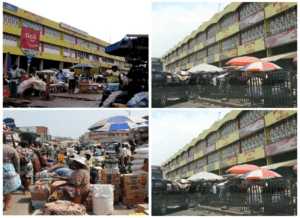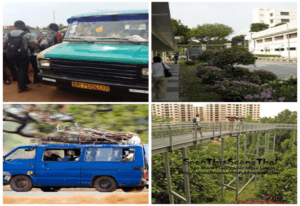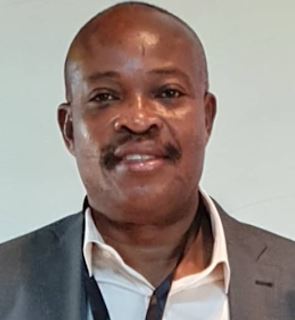By Shelter LOTSU(Dr)
Accra, the bustling capital of Ghana, is home to over 2 million residents and a key destination for tourists. The city is a vibrant hub of culture, business and history, yet it faces significant challenges that undermine its potential.
For example the unregulated use of roadside pavements as markets, roadside vehicle tire mending, and the inadequate public transport system contribute to traffic congestion, reduce urban appeal and impair Accra’s standing as a tourist destination. It is imperative for city authorities to address these issues effectively to transform Accra into a cleaner, more efficient and aesthetically pleasing city.
Current challenges facing Accra
- Unregulated roadside markets
The transformation of roadside pavements into informal markets has become a common sight in Accra. This phenomenon obstructs pedestrian movement, forces people to walk on the roads and exacerbates traffic congestion. For instance, areas like Circle and Makola are notorious for these unregulated markets, where vendors occupy sidewalks, selling everything from vegetables to electronics. According to a 2023 report by the Accra Metropolitan Assembly (AMA), such activities have led to a 30 percent increase in pedestrian-related traffic accidents.
World-class walkways for pedestrians and planting zones to absorb the carbon from moving vehicles provided along the iconic Achimota-Ofankor road have been painfully condemned to roadside markets. The Tetteh Quarshie-Adentan road has not been spared the menace of tables and metal containers to market merchandise. Clean and well-preserved infrastructure provide the tourist appeal for cities around the world.

Roadside vehicle repair activities
The presence of roadside vehicle repair services, especially tire mending, further clogs the streets. Mechanics and vendors occupy portions of the road, creating bottlenecks and obstructing the smooth flow of traffic. A survey by the Ghana Urban Mobility and Accessibility Project (2022) revealed that such roadside activities contribute to a 25 percent reduction in overall road capacity during peak hours.
Vehicle repairs and tire mending on the roads reduce the capacity and forces pedestrians unto the carriageway
Inadequate public transport system
Accra’s public transport system, primarily dominated by tro-tros (shared minivans), is poorly regulated and lacks adequate infrastructure. These vehicles often stop indiscriminately to pick up and drop off passengers, further disrupting traffic. The absence of well-organised bus stops and schedules compounds the issue. According to the World Bank’s 2022 Urban Mobility Report, Accra’s public transport efficiency is rated at 35 percent, one of the lowest among major African cities.

Global best practices in urban management
Around the world, cities that effectively manage urban infrastructure stand as models for Accra. For example, Singapore has implemented strict regulations on roadside activities, maintaining clean and orderly streets. The city’s efficient public transport system, comprising buses and trains with dedicated lanes and stops, enhances mobility and reduces congestion.

Choose regulated living to enhance the the overall quality of life and economic prosperity.
Copenhagen promotes cycling with extensive bike lanes and pedestrianised zones, contributing to its reputation as one of the world’s most livable cities .
Tokyo is renowned for its meticulously maintained urban spaces and efficient public transport system, which seamlessly integrates buses, trains and subways .
These cities prioritise cleanliness, effective regulation of street activities and efficient public transport systems, demonstrating that Accra could greatly benefit from adopting similar strategies.
Recommendations for Accra’s city authorities
- Enforce regulations on roadside activities
The AMA should enforce regulations to restrict the use of pavements and roadsides for markets and vehicle repairs. Establishing designated zones for these activities can help alleviate congestion and ensure pedestrian safety.
- Develop organised markets
Constructing organised market spaces equipped with necessary facilities can relocate informal vendors off the streets. Successful examples include the Makola Market Redevelopment Project, which provided structured trading spaces and reduced street clutter.
- Upgrade public transport infrastructure
Investing in a more efficient public transport system, including well-marked bus stops, dedicated bus lanes and a reliable schedule, can improve traffic flow. Lessons can be drawn from the Bus Rapid Transit (BRT) system in Lagos, which has significantly enhanced urban mobility.
- Promote urban cleanliness
Regular street cleaning and waste management programmes are crucial. The introduction of more waste bins and public awareness campaigns about littering can foster a culture of cleanliness.
Conclusion
Revitalising Accra requires a concerted effort from city authorities to enforce regulations, upgrade infrastructure and promote cleanliness. By addressing the unregulated roadside activities and improving the public transport system, Accra can enhance its urban environment, making it more attractive for residents and tourists alike. A clean and orderly city not only reflects a positive image, but also contributes to the overall quality of life and economic prosperity.
Sources
- Accra Metropolitan Assembly (AMA) 2023 Report](https://ama.gov.gh)
2.Ghana Urban Mobility and Accessibility Project (2022)](https://urbanmobility.ghana.gov)
- World Bank Urban Mobility Report (2022)](https://worldbank.org/urban-mobility)
- Singapore Urban Development](https://ura.gov.sg)
- Copenhagen’s Cycling Infrastructure](https://copenhagenize.eu)
- Tokyo Urban Management](https://tokyo-urban.com)
- Makola Market Redevelopment](https://ghanabusinessnews.com/makola)
- Lagos BRT System](https://lagosbrt.ng)
Dr. Lotsu is a consultant with over 28 years in civil engineering construction and project management, project finance specialist and has in the last 5 years focused on business strategy and ESG sustainability. As an engineer, Dr. Lotsu believes in creating environments where mutual success is achieved through understanding and cooperation. He is the founder and CEO of TSL Sustainability.










